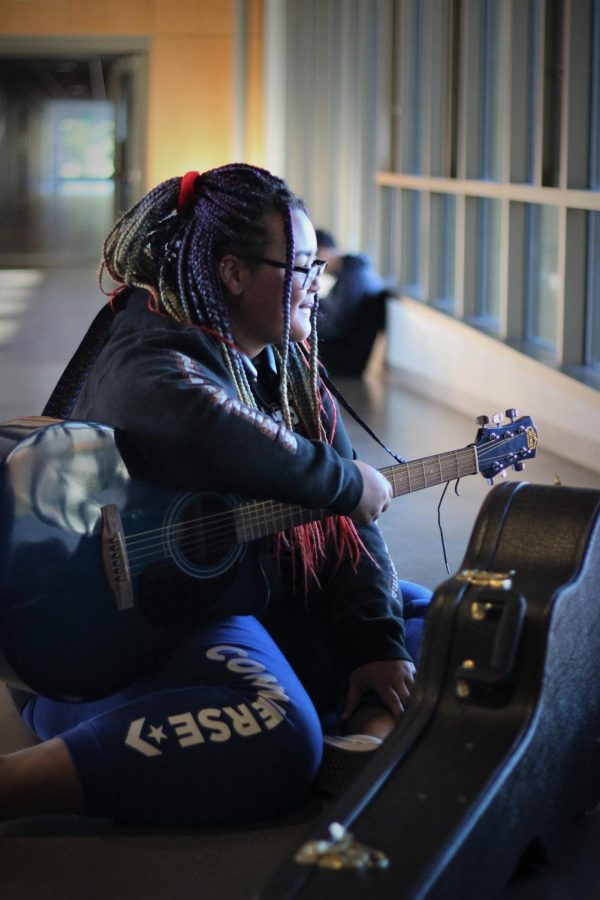Equality Towards LGBTQ+ Community: Are They Getting It?
SELF-IDENTITY: LGBTQ+ Members of the LGBTQ+ community are yet to be completely accepted in society, however, efforts are being made to establish more inclusiveness in schools, workplaces, etc.
January 24, 2020
In modern-day society, there has been a great advancement in many fields. This includes technology, agriculture, and many other subjects. It is unfortunate, however, that after so much growth in people’s mindsets and ways of thinking, many groups are still discriminated against. A prominent example of this is the LGBTQ+ community. The group is often misunderstood and judged for stereotypical stances that many people hold about them. Many people know what LGBTQ+ stands for, but only a few outside the community truly understand how they feel and are treated in everyday life.
As sophomore Surya Bollapragada confirms, “LGBTQ+ stands for Lesbian, Gay, Bisexual, Transgender, and Queer.” Gender is typically described in terms of femininity and masculinity. This has become a system through social construction which varies across different cultures and over time. In several cultures, greater gender diversity exists, but in society, gender is divided along binary lines such as male and female. Freshman Adora Hsien says, “The idea of there being more than two identifications in gender is partly unaccepted because of religion.” As many are taught since childhood that there are only two specific genders, people are resilient towards accepting the LGBTQ+ community as “normal.” Even after the progression that has been made within the community, discriminatory beliefs and behaviors have been magnified rather than eliminated.
People that classify under the umbrella of LGBTQ+ are often made outcasts and are left out of social groups. While it is less common among children, members still face issues of prejudice, discrimination, harassment, and even violence. It is an unfortunate reality that people within the LGBTQ+ community have a harder time accepting and loving themselves due to the stereotypes associated with them. According to an interview on The Intelligencer, “‘A lot of the violence against people in the LGBT community is because people feel they do not fit the gender stereotypes, or the gender expectations for what men and women are supposed to be’” Due to the narrow viewpoints and oversimplified ideas regarding this group of people, the acceptance level of groups other than male or female are very low. Much of the LGBTQ+ community has to hear countless derogatory comments regarding the way they identify themselves. According to Thought Catalog, these beliefs include, “‘It’s just a phase, it’s a choice, they are weak, and they don’t deserve the same levels of respect.”
What some do not agree with is that individuals belonging to the LGBTQ+ community deserve the same rights as every other member of society. Senior Jason Liu said, “I believe that everyone deserves to be accepted, as it is a human right.” Negative comments that are constantly being said about them can be extremely irritating and can severely lower one’s self-esteem, leading to the development of social anxiety or a self-identity crisis. According to Healthy Place, “Many people who are members of LGBTQ+ suffer from mental illnesses like depression and anxiety.” Such feelings can lead them to attempt life-threatening actions in the future due to not being accepted. Not only are they discriminated against by people in their surroundings, but some offices and workplaces also refuse to completely accept LGBTQ+ people. According to American Progress, “A transgender teenager who was admitted to a hospital for suicidal ideation and self-inflicted injuries was repeatedly misgendered and then discharged early by hospital staff. He later committed suicide.” With consistent critique of the LGBTQ+ community, they begin to feel less of themselves and decide to take life-threatening actions. This is awful because the actions of one group of people are causing the instability of another group of people.
At Issaquah High School, the Sexual and Gender Awareness (SAGA) Club has been established, a club that, according to adviser Mark Moody, “provides a safe space for students to gather and be supportive of one another, address current queer topics in media and society, and create outreach to IHS to increase awareness of LGBTQ+ presence at IHS.” Moody says, “I believe that most of the staff are accepting of LGBTQ+ people. I have also seen an increase in attendance at SAGA Club meetings over the past three years that I have been the adviser. I also hear students talking more openly about who they are and how they identify than they did a few years ago, so I would like to think that there is a growing number of students that are accepting of LGBTQ+ people at IHS. However, I have also heard students say that microaggressions toward LGBTQ+ people at IHS continue to be a problem [whereas the obvious aggression and overt bullying has subsided].” At IHS, SAGA Club has taken a step toward accepting the LGBTQ+ community and giving an equal platform to them. Due to the long history of discrimination towards LGBTQ+ people in society through media, certain religious beliefs, and xenophobia, the community has not been completely integrated into society.. Although acceptance rates is changing, there is a lot to construe for people who are influenced by discriminatory beliefs.
Accepting your identity is not easy, but once you do, it is a lot simpler to fit into a place among others. Nevertheless, even people who do not identify as part of the LGBTQ+ community need to realize and understand that at the end of the day, everyone is human and that everyone deserves the same respect and rights.



